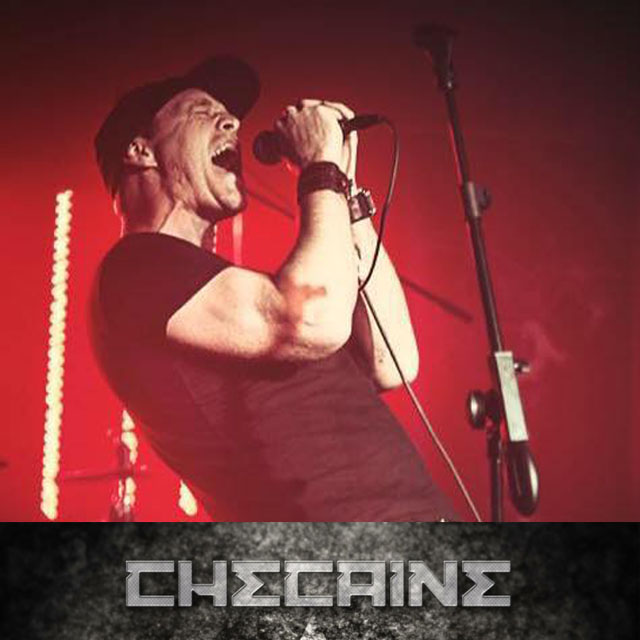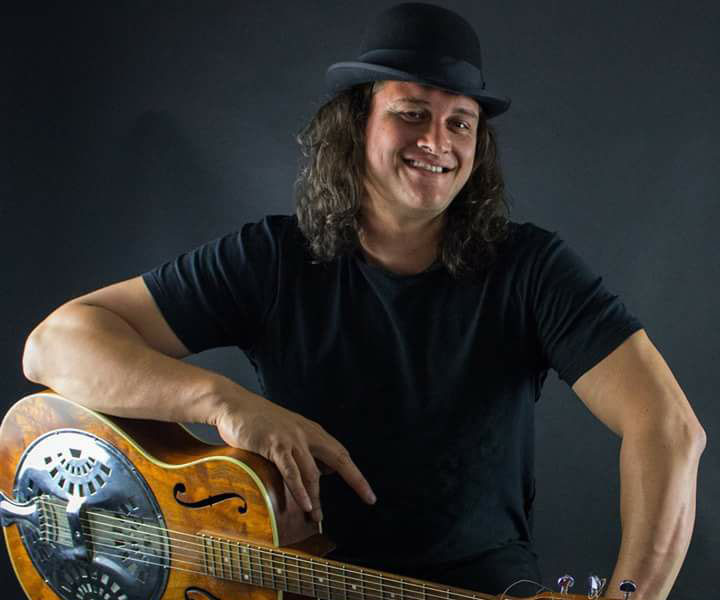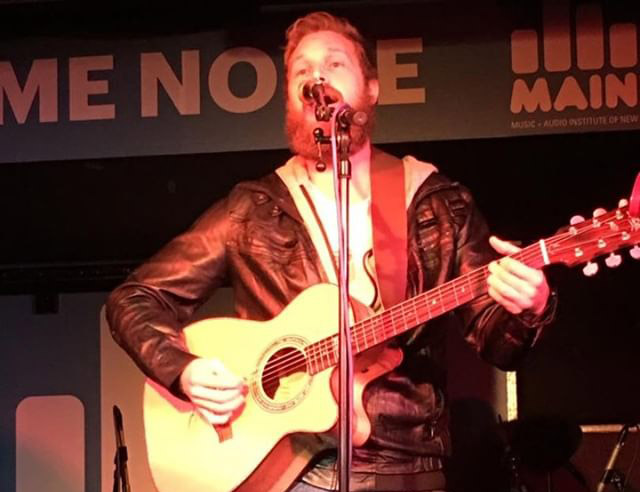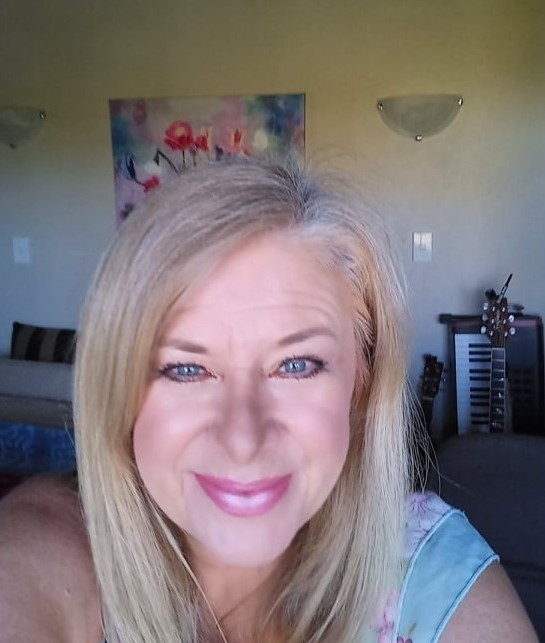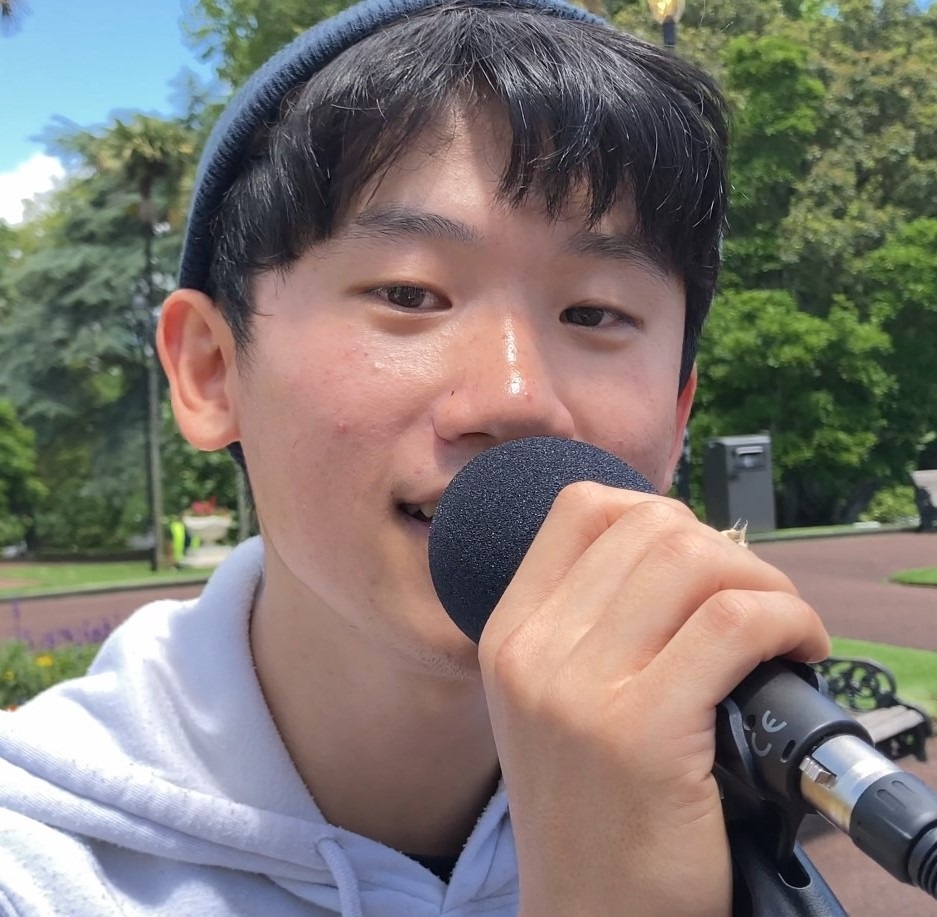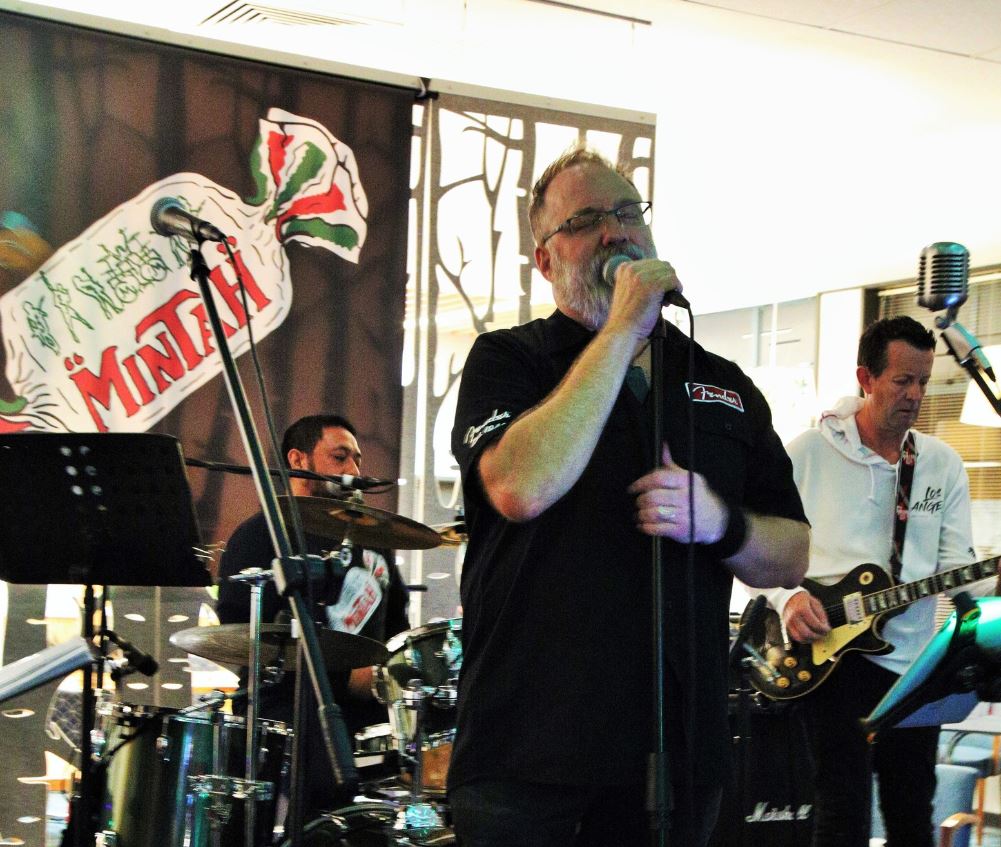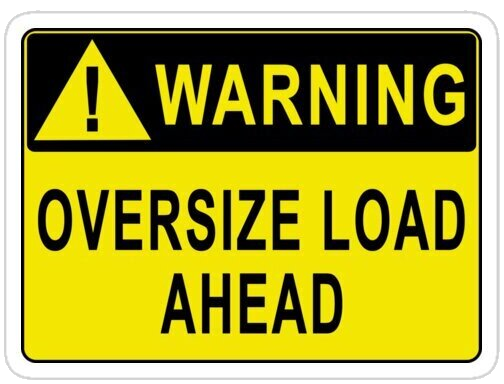Fraser Coombes – Lead Vocalist, Checaine
I began vocal training session with Paule with the goal of bridging a mid range gap in my vocal range.
Although I had sung for a number of years and would consider myself an experienced performer in the genre of rock/metal, I was at a stage where I was simply not making the connections and progress I wanted on my own.
My original rock band Checaine were in the midst of recording our debut album when I felt the use of a professional vocal coach may just help me sound smoother and more connected with my voice and the listener.
After an initial diagnostics session, in which Paule gave his professional audit on the condition of my voice and potential, he created a tailored vocal training programme. Although Paule encouraged me to identify the areas of my voice I’d like to work on I found his programme and content during lessons specifically targeted the areas I needed to work on without even realising myself. Paule has worldwide connections with some of the globe’s most renowned vocal coaches.
His information is current and his ability to get results out of his students by using the latest tricks of the trade is second-to-none.
It’s worth me mentioning that Paule is the fourth vocal coach I have used. I wish I had saved my time and money and gone straight to Paule.
A key area of learning for myself was around vocal health. Paule taught me the importance of treating your voice like a highly sensitive instrument. I was intrigued to learn about foods that should be avoided as a vocalist, dietary habits and the power of water.
If you are looking for that little bit of help to speed up your learning progress and are interested in any of the following I can confidently recommend Paule as the vocal coach to deliver the results you are striving for.
Weekly practice routines, how to train the voice safely, vocal health, pre-show warm ups, post-show warm down, how to perform when you have a cold, healthy/safe voice distortion, the power of blurb exercises, blend and vowel pronunciation, vowel modification, range extension, performance techniques, marketing advice and much much more.
Since having vocal training with Paule, my band has gone on to play gigs with Devilskin, I Am Giant, Setting Fire To Stacey, Ekko Park and many more.
Paule is a big believer in using analogies during his training sessions to ensure the student has a true understanding of the technique or pivotal learning moment in a lesson.
If you are looking to improve your voice then look no further than Paule. If his sheer enthusiasm for singing and your progress don’t motivate you on their own I’ll eat my hat!
Every time I take the stage now I do so with the confidence that I have the right tools and techniques to deliver a great performance.
Thanks Paule! You Rock!
Kara James Gordon – Touring Artist
Paule from RVR has helped me immensely with my vocals.
I have been a professional musician for years thought i was doing alright with my singing, but Paule showed me the real deal way to sing by using my diaphragm breathing and taught me facial and lung strengthening exercises that have helped take me to the next level of vocal performance.
People who have come to my gigs for years have noticed improvements in my power, tone and pitch. The improvements have happened since i started going to Paule for coaching.
This guy knows his stuff!
Kara’s performance credits:
- Opened for Slash, Ozzy Osbourne, Joe Satriani and Elton John
- Performed with Glen Hughes (Deep Purple)
- Toured internationally throughout New Zealand, Australia and Europe with Alabama 3
- Toured New Zealand and Australia as part of the “Fly My Pretties” tour
P.S. The video below was recorded before I started taking singing lessons with Paule. I will post a video soon to show you a difference that coaching has made to my voice!
James Price – Contemporary Music and Performance Graduate
Long story short. If I knew of Paule’s existence from day 1, I wouldn’t have gone anywhere else.
Hey all, I really want to take the time to acknowledge Paule Enso and his Rapid Vocal Results Coaching Programme. If you’re considering vocal lessons from Paule, it’s important to understand my journey but also the journey you are considering embarking on.
I’m 31 years old and been singing for about 5 years now. I wanted to sing since I was 18 but was laughed at when I first tried and unfortunately that shattered all my confidence until recently. I understand what it’s like to be scared to sing in front of family and friends. To have your voice lock up and your throat hurt. To have muffled sound and sing off pitch. To feel intimidated when someone else is listening, causing you to shake and squeak.
I also now understand the rush from performing, to have someone lock eyes with you and almost cry because you made a connection with them in ways that perhaps something else quite hasn’t. I now understand and feel how powerful it is to have someone tell me how much I’ve improved or that I “Have a beautiful voice”. Things I never thought was possible. I now first-hand understand how rewarding that feels.
My vocal experience ranges from 5 different vocal coaches, including one from musical study at University.
Long story short. If I knew of Paule’s existence from day 1, I wouldn’t have gone anywhere else.
With that said I do want to acknowledge the value from past coaches and lessons learned along the way as it all stacks up. It’s only from embarking on this vocal journey that I have a clear understanding and now can recognise and appreciate the level at which Paule teaches. When you first meet him, you can instantly tell he takes his profession and craft seriously. He is passionate about what he does, and he gives nothing but 100%. Paule Enso is Rapid Vocal Results.
Paule has such a diverse understanding of music and a variety of skills that he is able to answer EVERY question I’ve thrown at him, in a way that is easy to understand and furthermore can prove his answers correct by actually demonstrating the answer through his own practical vocal ability. Paule and I connect very well. I hope he laughs at this but occasionally I get frustrated in lessons because our time together is so valuable that if I’m not understanding something well or picking it up as fast as I’d like, I get a bit impatient or really test him with questions and my opinions which he handles just fantastic and still manages to help me understand or challenge me in ways that I need until our next lesson together.
This is important because most vocal coaches I’ve had have not always been able to explain to me the purpose of their own exercises or instantly demonstrate their knowledge to me in a practical application that proves what they are saying. Most the time Paule makes me prove to myself what he’s saying which is usually a humourous/breakthrough/rapid vocal result moment.
Paule teaches in a more holistic way, in that he really connects with the emotional part of yourself and in turn, you connect emotionally with yourself too. This really helps deliver key concepts and learnings into bite sized, easy to digest pieces. He encourages you, builds you up all while being genuine and honest. He listens and understands what it is you want to achieve, then sets out to help you accomplish your goals. It’s so important to have this as a musician because we all have a story to tell, we all have something to share and we can’t create a genuine performance that leaves a lasting impact on the listener without giving the true representation of our emotions.
Paule understands what vocal challenges you are having and why, he will advise how to overcome them usually improving on them instantly, though you do need to put in the hard work to practice between lessons.
Because of his diverse music experience, his lessons not only incorporate vocal training but also interweave ear training and understanding of how chord progressions and songs are made. If you are an aspiring singer/songwriter, this is A BIG DEAL. Let me explain:
I studied music and graduated a Certificate of Contemporary Music and Performance. Why?
To become a great vocal performer and understand what it means to be a singer/songwriter and create my own music.
Did this happen?
Not really. University was great in that I got some hands-on band experience, learned music theory, built confidence and had the occasional vocal lesson. But to be blunt, it was a waste of 12 months and the money which would have been better spent learning elsewhere.
Paule Enso is the best vocal coach I’ve had and that is a bold statement. I’m at a place in my life where I live and breathe music performance. I’m not prepared to settle for anything less than the best as I want results, and I want them now. If there’s one thing I’ve learned about singing is that anyone can do it, but it doesn’t happen overnight. You need to be ambitious, motivated, supported, consistent with practice, have a live performing outlet and ultimately the correct guidance every step of the way.
Paule is not only my vocal coach, but he’s my mentor too, and after 8 months of weekly vocal lessons, he is a good friend of mine.
To anyone seriously considering a vocal coach who will deliver results, Paule Enso has been the best that I’ve had to date and I’m overwhelmingly excited to see what the next few years has in store for my development.
Thanks, Paule.
– James Price
Kim Rose Fairthorne – Former MAINZ Student
Dear future RVR students,
I have been having vocal lessons with Paule and I have noticed improvements right from the very first lesson.
I had previously gained a lot of bad habits from watching YouTube videos of vocal coaches, but, with no feedback I was unable to understand what I was doing wrong and why it was not working for me.
Prior to lessons with Paule, I could relate my singing to driving a manual car in the wrong gear. Not only did I not even know I was in the wrong gear, I was completely afraid of breakdowns and not wanting to go anywhere with it! I was revving the heck out of my engine at the high end of the scale and bunny hopping and konking out at the low end of the scale.
Paule has shown me how to be in the right gear for every note, how to not run on empty while breathing and how to not overfill the tank. We are currently working on my confidence and performance and I am finally starting to feel like I have traded my old manual car in for a smooth running automatic, sleek and street worthy!
Paule has also given me expert advice on the musicality of my original songs. I would highly recommend Paule to anyone interested in improving their singing voice.
Kind regards,
Kim Rose
Noel Choi
Prior to RVR, I was experiencing vocal bowing, struggling to hit high notes and was straining my neck while singing.
Through Rapid Vocal Results, I was able to overcome vocal bowing, learned to sing with less strain, and learned to hit higher notes effortlessly.
Paule makes each lesson fun with the energy he brings. He is very familiar with vocal pedagogy and the anatomy of singing. Each lesson, I would have epiphanies and “woah!” moments, being able to sing certain notes or sound in a certain way that I would have struggled to do before. I saw noticeable significant improvements over time.
I would highly recommend Paule’s Rapid Vocal Results to anyone serious about improving their singing skills quickly.
Mike McGregor – Lead Singer of MinTaH
We can get so complacent in our own instrument, that sometimes it is just necessary to once again be the student.
I came to Paule Enso of RVR in the summer of 2019. I had been singing and performing for a while, but had yet to discover what my voice could really do. I was singing with a lot of tension, which hindered my stamina, my range, and my vocal freedom. I also felt a little bit lost vocally.
Paule Enso of RVR is far and beyond the best voice teacher I’ve ever had. I feel incredibly lucky to have found him in my vocal journey, and I am so glad to be studying with him again a few years on.
The thing I appreciate most about Paule’s teaching is his empathy and ability to communicate new concepts. On top of that, his technical knowledge of the voice is unparalleled. There is not a single person to whom I wouldn’t recommend him.
Keith Pratt
I have been working with Paule for about 9 months and he has helped take me from a non-existent singing voice to a voice that my band mates are very happy with and they say that it is improving all the time under Paules guidance.
His Rapid Vocal Results method help you achieve whatever level you want, providing you put in the work.
Paule is a tough taskmaster, but the end results are there to prove his methods work. Paule is great to work with and individualises his lessons to make them work for you.
I highly recommend Paule’s processes and teaching methods!
The benefits of warming up your voice
Sometimes the most professional, big time singers are the worst at following a structured warm up routine. The benefits of warming up your voice prior to your singing practice, rehearsing with the band, recording in the studio or of course performing live are undeniable.
It’s the goal of this post to help you learn from their mistakes and to look after your instrument by maintaining good vocal health. Your vocal cords can only tolerate so much misuse and abuse before they start to break down on you at the worst possible times.
As a vocal coach, it has been my fortune to be backstage with a number of seasoned, experienced, professional singers. I have observed first hand how big time singers are not always the best at following structured warm up routines, and their often haphazard approach to warming up the voice can do more harm than good.
I have seen impressionable, inexperienced singers follow the example of these big names with little or no structured warm up routines before singing. Just because they see and hear their idols not warming up, they think they can get away with committing the same vocal sins.
There are so many reasons to warm up your voice, including:
- Establishing correct diaphragmatic support and breathing.
- Warming up the vocal cords and exercising the tendons and ligaments that anchor our voice box (larynx) and are instrumental in helping us to enjoy freedom of movement to help us safely reach our lowest and highest notes, as well as everything in between.
- Maintaining or repairing minor vocal damage from the night before. An appropriate vocal warmup can help reduce swelling and inflammation in the vocal cords and can help you to achieve better cord closure.
- Warming up your voice prior to a gig allows you to refresh the muscle memories for both breathing and vocal coordination to allow you to sing at your best.
- An appropriately structured vocal warmup allows you to open up your airway and establish the correct open throat feelings and position to reduce strain on your voice, making it easier to hit those high notes.
- It gets your ears and your voice in tune pitch-wise.
- Your vocal warmup is your last opportunity to troubleshoot any challenge areas you have in your voice prior to going on stage or recording in a studio.
Popular excuses for not using a structured warmup for your voice
- “It’s just a band practice”
- “After a couple of songs on stage, my voice just warms up naturally anyway”
- “There’s no place to warm up. People will hear me!”
- “I usually just have a couple of drinks or a smoke or vape and I’m ready to go”
- “I’ve seen professional singers who don’t warm up and they sound great!”
If you’re a singer that doesn’t warm up before they begin singing, what’s the excuse that you use to avoid it?
Let’s shine a light on all of these excuses and see if they stand up under scrutiny:
- “It’s just a band practice”… Regardless of whether you’re singing for fun, or singing in front of a paying audience, the level of energy and the intensity that you exert on your voice is going to be very similar. If you are performing in front of a live audience, the majority of singers tend to sing a little bit harder and stronger because the adrenaline is running high. Your voice doesn’t care which of those two scenarios you’re operating in.
If you are singing high intensity rock or pop (or any style for that matter) and you neglect to warm up your voice, you will risk straining your vocal cords by applying excess force to a cold cord to sing higher. If you’re screaming without a warmup, that’s even worse on your poor voice. - “After a couple of songs on stage, my voice just warms up naturally anyway”… If you’re a singer that falls into this category, those first two songs that you’re straining to hit the high notes by using excessive tension on your cords and adopting the “weightlifting” mentality will contribute to a singing voice that will feel the effects of vocal fatigue later on in your set.
Any time that you need to push your voice to sing higher or stronger is a good sign that you’re singing on cold vocal cords and you’re risking vocal strain. This is not only in your voice, but in the tendons and ligaments that play such a crucial role in supporting your larynx when you sing. - “There’s no place to warm up. People will hear me!”... Most bars and music venues have bathroom stalls. They sometimes have little side rooms where you can go and do your warmup. Regardless of whether you need to warm up around other people or not, if you’re wearing headphones and singing along to a vocal warmup programme, you will be surprised how fast you forget about worrying what others think of you when you get on with the job of preparing your voice for top level performance.
- “I usually just have a couple of drinks or a smoke or vape and I’m ready to go”… I wish I had a dollar for every time I hear singers with a similar response to this. When you smoke or vape, you’re passing gasses across your vocal cords that are guaranteed to remove the protective layers of mucus that we rely on as singers to reduce harmful friction on the vocal cords when we sing.
You’re not doing yourself any favours here. Yes, you might like to have a smoke before you hit the stage to ease your nerves, but you can achieve the same effect through practicing singer’s breathing exercises that will help you to reduce pre-stage nerves without having a negative impact on your vocal cords.
As to alcohol, drinks are usually served cold and that’s where most of the problem lies. We want the vocal cords to be nice and warm to be able to perform at our best and you’re about to throw a cold drink down your throat. This is definitely going to mean that your vocal cords will take longer to warm up if you’re drinking a cold drink prior to singing.
It’s a commonly accepted practice to have a couple of shots of spirits before you hit the stage to “relax your voice” and deal with those pre-show nerves. This is a practice that professional singers like Sammy Hagar (ex lead singer of Van Halen) used to swear by before he hit the stage. The only problem with this is that if your vocal cords are slightly dehydrated to begin with, you’re going to make the situation worse for yourself and you’re going to be singing on a dry throat three or four songs in. You’re far more likely to be reaching for that cold drink to replace lost moisture in your throat, which is only going to make matters worse. - “I’ve seen professional singers who don’t warm up and they sound great!”… A perfect example of this is Joe Elliott from Def Leppard. There are nights when he basically just makes a whole bunch of screaming sounds backstage in an effort to warm up his voice. When you take on an unstructured warmup strategy like this, you run the risk of only warming up some areas of your voice and you can easily neglect the essential, foundational stuff like building good diaphragmatic breath support and establishing open throat technique prior to hitting the stage.
If you look at the rock singers in particular that are still out there and doing it night after night who have enjoyed long careers performing to arena-sized audiences, these singers tend to fall into one of three simple categories. The first category is people like Glenn Hughes (ex Deep Purple) who is still capable of hitting all of his high notes in his 70s, for iconic songs like Mistreated and Highway Star. Glenn has maintained his phenomenal vocal range and his vocal agility and is a better singer now in his 70s than he was when he was in hsi 20s. This is due to great vocal technique and great vocal maintenance routines for his voice.
The second category is all the rock singers that were born with above average mass and length in their vocal cords that have tended to take their vocal powers for granted and have neglected to maintain structured vocal exercise and warmup routines prior to touring and during touring. We see an astounding number of these singers now in their 50s and 60s whose voices are breaking down because they have not been properly maintained. Regular vocal maintenance and warmup routines can help to offset unhealthy habits like drinking and smoking because vocal cords as they get older, if they’re not properly maintained, tend to lose their vocal agility and take much longer to repair.
The third and final category and singers who are experiencing a variety of vocal conditions, including polyps, nodes, cysts and partial vocal cord paralysis. Regular vocal exercise routines, and regular pre-show structured warmup routines can greatly reduce the risk of developing nodules, polyps or cysts on your vocal cords, as well as being able to aid in the treatment and reduction of any existing conditions that may be developing on your vocal cords.
When you do a vocal warm up, it helps to warm up your body as well! Singing any form of high-energy music requires a warm body and a warmed up set of vocal cords to not only help you sing at your best, but to also prevent injuries to both your vocal cords and other muscles or parts of your body, like your jaw. A warm body from a good, structured warmup routine can help to prevent damage from pushing too hard in your stomach area, which is something that happened to Lincoln Park’s Chester Bennington (RIP).
Better information leads to better singing.
The dangers of “go big or go home” mentality for singers
In my experience, singers fall into three main categories regarding the size of their voice:
- The first category are the singers with the above average vocal cord mass (thickness) and above average strength in their larynx mechanism.
- The second category are people with average sized vocal cord mass and average strength in their singing mechanism.
- The last category of course, are people who have undersized vocal cord mass and a lower level of overall strength in their larynx.
There are other categories of course, but for the purpose of this article we’re going to keep it simple by assuming that most singers sit in one of these three categories.
In over 20 years of coaching experience, I’ve observed that the singers with above average vocal cord mass tend to sing with a natural balance to the size of the sounds they are producing. This simply means that their vocal mechanism is able to perform the various coordinations efficiently within the larynx to produce a rich, warm tonal, round sound.
In other words, good singers that are born with above average mass always sing in a way where they have control over the song. There are exceptions to these rules, but for the most part these observations are accurate.
Whereas singers that are born with average mass in their vocal cords tend to try and subconsciously and/or consciously make bigger vocal sounds than their vocal mechanism is able to comfortably support. This will create a number of vocal challenges and difficulties and will literally (in most cases) sabotage and prevent the singer from ever reaching their full vocal potential.
Those people born with smaller than average vocal cords tend to have an even bigger Napoleon complex, in other words the singer with the smaller voice often tries to over compensate and create a bigger sound than what their vocal mechanism can initially handle.
In the short term, this will show up in the singer as sung notes that sound very strained. The notes will sound dull and flat. When you understand a little bit more about the actual mechanics of singing, it’s no surprise that all of this additional, excessive pressure and tension that they’re applying to their vocal cords leads to a disappointing vocal performance. This means less paying customers in the future!
The consequences of making your vocal sounds bigger than they need to be
These consequences include:
The singer always needs to be in control of the song.
- Poor cord closure. The goal of every melodic singer is to learn how to use their vocal mechanism correctly to produce the closest thing they can get to a speech-level cord closure on pitch i.e. The notes that they sing need to have the same cord closure as a spoken phrase.
- Excessive tension. Making the sound too big and too heavy can very quickly overload the larynx mechanism and your voice will experience restriction in range. You will likely experience tension in your jaw and constriction in your throat.
This will lead to what I affectionately refer to as the “strangled cat syndrome”. Hopefully no further explanation is necessary because every singer has experienced those exact vocal challenges at some point in their quest to sing higher and extend their vocal range. If this is you, don’t worry – you’re not alone! This is a temporary vocal affliction and it can be resolved through proper coaching instruction and through a better understanding of the role the larynx plays in efficient pitch production and changing vocal registers. - Passing excessive amounts of air through the vocal cords. This results in what we commonly refer to as a “breathy” singer. This is the equivalent of opening your mouth and aiming the air of a blow dryer into your throat. In a very short period of time, that hot air is going to dry out your vocal cords and it’s going to be dryer in there than the Sahara desert!

While some singers no doubt use this technique to achieve a smoky quality to their vocal tone, the reality is when you pass excessive air through your vocal cords, the air passing through those cords will quickly dry out your voice and remove the protective layer of “mucosa” (the singer’s lubricant that naturally protects our cords and reduces the effect of friction on the vocal cords when we sing). When we remove that protective layer of the singer’s lubricant, our vocal cords are prone to heating up, causing them to swell and become inflamed. This is a very common cause of hoarseness in singers and in some cases can lead to complete loss of voice.
Singers that prolong this style of singing i.e. who are passing excessive air over the vocal cords, be it unintentionally or intentionally, run the risk of exposing their cords to damage. This includes but is not limited to the growth of nodes (nodules), polyps and cysts on the vocal cords, among other conditions that could affect vocal performance.
Examples of “breathy” singers are Adele and Sam Smith. Both of whom coincidentally have experienced vocal conditions that have required surgery to remedy. - Limited range. If a singer is makes their vowel and consonant sounds too big, they are running the risk of overloading the vocal mechanism with excessive weight and tension that will prevent the laryngeal tilt, which is the natural mechanism in the voice, from being able to change pitch and register freely and easily as it’s designed to do.
This tends to be less of an issue in the bedroom (in front of the mirror when you’re rehearsing), but it’s a different story when you finally hit the stage and you’ve got that expectant audience in front of you and your “performer’s adrenaline rush” kicks in.
Often the combination of a performer’s adrenaline rush and any pre-show nerves will dramatically increase the potential of you experiencing the “sing big or go home” mentality. That carefully rehearsed song in the bedroom, or the shower, or the lounge where you hit all the notes and you sound like a million bucks suddenly feels like the combination of weightlifting contest and a wrestling match with your larynx.
If you find yourself identifying with the topics raised in this article and you want to take your singing to the next level, let’s have a conversation.
Better information leads to better singing!


